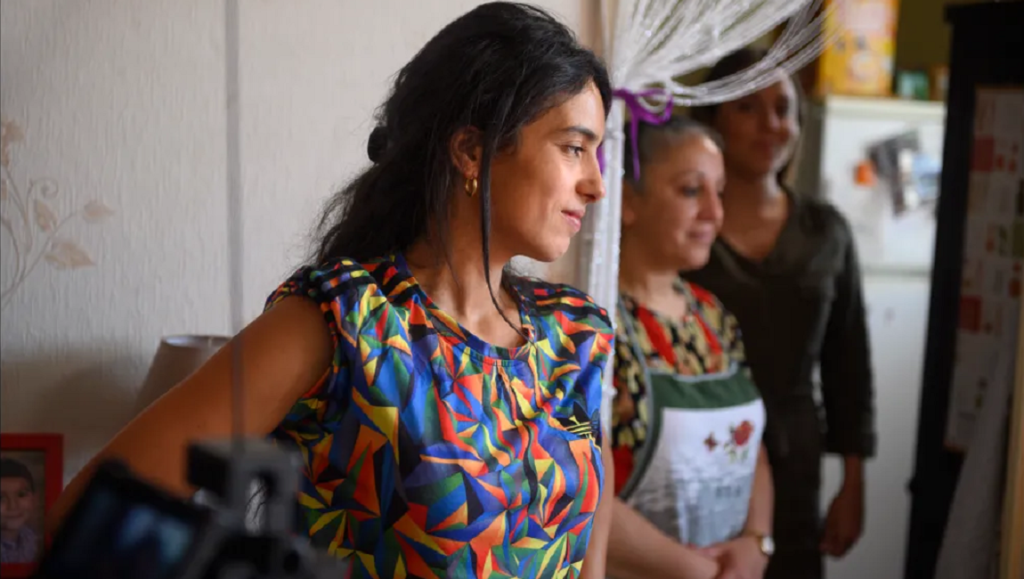Bonne mère, the second feature from actress and writer-director Hafsia Herzi, locates itself in the city of Marseille. Once known for its wealth and grandeur, it is now more famous for its steadily rising crime rates and economically depressed population, embodied here by one lone family desperately trying to make ends meet. Mother Nora (Halima Benhamed) works full time for the local airport as a cleaner, while also serving as caretaker to an elderly neighbor. She has two grown children at home — daughter Sabah (Sabrina Benhamed) and son Amir (Malik Bouchenaf) — as well as a daughter-in-law and two grandchildren, all sharing space in a tiny apartment. Meanwhile, her eldest son, Ellyes (Moura Tahar Boussatha), is incarcerated for an unknown crime and awaiting trial, requiring exorbitant lawyer fees that bleed the family dry.
Bonne mère, whose title roughly translates into English as Good Mother, presents itself as a quiet character study on matriarch Nora, but is more accurately a portrait of a devastated city and the broken system that keeps its citizens as its indebted servants. There is no dreaming of a better life, as the bitter taste of disappointment has already poisoned their palate from birth. Yet, as Herzi makes devastatingly clear, that doesn’t have to cost one the price of their humanity. Nora is in her sixties and seems beaten down by life. She is quiet, never raising her voice above a whisper, even when she is chastising her daughter’s parental skills or passive-aggressively berating her son as she gets down on her hands and knees to clean up his messes. She wakes before dawn each morning to watch the sunrise, a brief moment of tranquility and beauty that she clearly relishes, even as she knows the upcoming day will only bring back-breaking work and a lack of recognition from her family. But she soldiers on, emboldened by her love for both them and her friends and co-workers.
Herzi’s directorial style is best described as observational. Nora is never sanctified or presented as a martyr. She simply exists, and the camera follows her through her trials and tribulations, serving as a silent witness. Nora, her family, her co-workers, even the city itself—all possess an authenticity that feels honest and lived-in. Even when the film ventures into potentially sensationalistic territory, such as daughter Sabah taking a job as a BDSM dominatrix, Herzi keeps to subtlety, never once depicting the actions that are graphically discussed. While the subplot itself seems borderline absurd, a blunt way of underlining just how far these individuals will go for a couple of dollars, there is more going on than meets the eye, as Herzi is undoubtedly aware of the irony that exists in the wealthy upper class paying large sums of money to its destitute citizens in order to punish, humiliate, and, in some instances, sodomize them for their own pleasure. After all, the wealthy have been fucking the underprivileged and working class citizens for years. The fact that Sabah is punished for taking things “too far” with a client is…rich, let’s just say that, and more than a little clever.
Meanwhile, the cast as a whole is uniformly fantastic, feeling like an actual familial unit that has known each other for decades, but it is Halima Benhamed as Nora who proves an absolute revelation, more so for the fact that this is her acting debut. Accompanying daughter Sabrina to her audition, Herzi saw a quiet grace and humility within Halima that she could not shake, with Halima finally accepting the role after multiple requests. The amount — and subtlety — of acting that she manages, even with something as cliche as staring into the distance, is nothing short of remarkable, and when she finally lets down her guard near the film’s end after receiving a gift from her co-workers, the moment feels earned. Good Mother is very good indeed, quietly devastating yet simultaneously life-affirming, and marks Herzi as a rare talent behind the camera. This one deserves to find an audience.
Published as part of Cannes Film Festival 2021 — Dispatch 8.


Comments are closed.